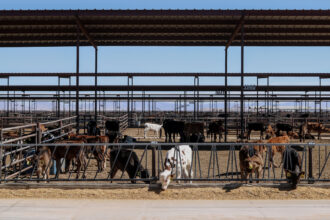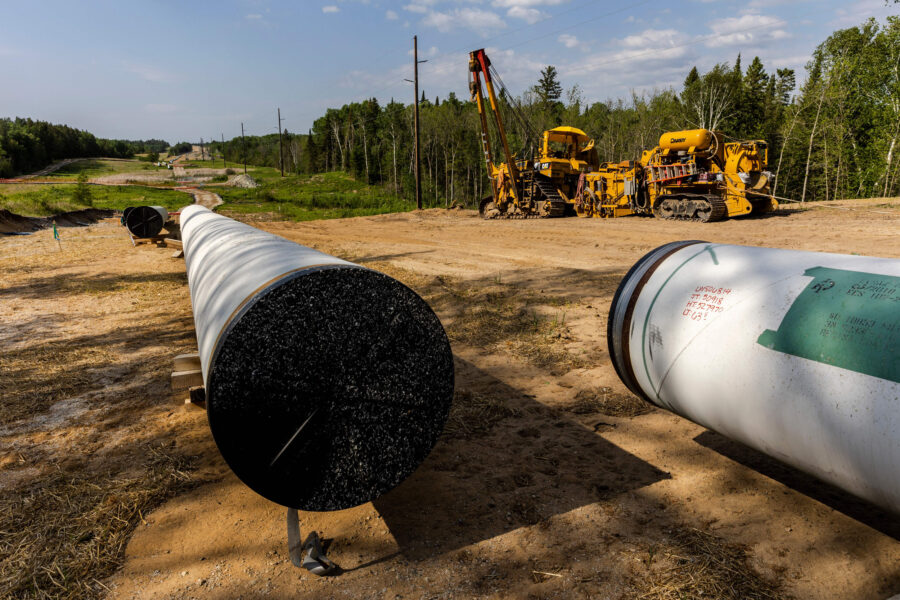Inside Climate News staff reporters Liza Gross and Aydali Campa have been recognized for series they wrote in 2022 holding environmental regulators accountable for potential adverse public health effects related to water and soil contamination.
The Park Center for Independent Media at Ithaca College announced Thursday that Gross had won a 2023 Izzy Award for her series “Something in the Water,” in which she showed that there was scant evidence supporting a public assurance by California’s Central Valley Regional Water Quality Board that there was no identifiable health risk from using oilfield wastewater to irrigate crops.
Despite its public assurance, Gross wrote in the series, the water board’s own panel of experts concluded that the board’s environmental consultant “could not answer fundamental safety questions about irrigating crops” with so-called “produced water.”
Gross, based in Northern California and author of The Science Writers’ investigative Reporting Handbook, also revealed that the board’s consultant had regularly worked for Chevron, the largest provider of produced water in oil-rich Kern County, California, and helped it defend its interests in high-stakes lawsuits around the country and globe.
Gross, whose work at Inside Climate News is supported by Clarence E. Heller Charitable Foundation, shared the 2023 Izzy awards with The Lever and Mississippi Free Press for exposing corruption and giving voice to marginalized communities, and Carlos Ballesteros at Injustice Watch, for uncovering police misconduct and immigration injustice.
This story is funded by readers like you.
Our nonprofit newsroom provides award-winning climate coverage free of charge and advertising. We rely on donations from readers like you to keep going. Please donate now to support our work.
Donate NowThe award is named after the late I.F. “Izzy” Stone, a crusading journalist who launched I.F. Stone’s Weekly in 1953 and covered McCarthyism, the Vietnam War, the civil rights movement and government corruption.
Earlier in March, Campa was awarded the Shaufler Prize by the Walter Cronkite School of Journalism and Mass Communication at Arizona State University for her series, “The Superfund Next Door,” in which she described deep mistrust in two historically Black Atlanta neighborhoods toward efforts by the Environmental Protection Agency to clean up high levels of lead, a powerful neurotoxin, that remained in the soil from old smelting plants.
The residents, Campa found, feared that the agency’s remediation work was part of an effort to gentrify the neighborhoods. Campa showed how the EPA worked to alleviate residents’ fears through partnerships with community institutions like the Cosmopolitan African Methodist Episcopal Church in the Vine City community, near Martin Luther King Jr.’s home on Atlanta’s west side.
Campa, an alumnae of the Cronkite School’s Howard Center for Investigative Journalism, wrote the series last year as a Roy W. Howard fellow at Inside Climate News. She is now ICN’s Midwest environmental justice correspondent, based in Chicago.
The Shaufler Prize recognizes journalism that advances understanding of, and issues related to, underserved people, such as communities of color, immigrants and LGBTQ+ communities.
About This Story
Perhaps you noticed: This story, like all the news we publish, is free to read. That’s because Inside Climate News is a 501c3 nonprofit organization. We do not charge a subscription fee, lock our news behind a paywall, or clutter our website with ads. We make our news on climate and the environment freely available to you and anyone who wants it.
That’s not all. We also share our news for free with scores of other media organizations around the country. Many of them can’t afford to do environmental journalism of their own. We’ve built bureaus from coast to coast to report local stories, collaborate with local newsrooms and co-publish articles so that this vital work is shared as widely as possible.
Two of us launched ICN in 2007. Six years later we earned a Pulitzer Prize for National Reporting, and now we run the oldest and largest dedicated climate newsroom in the nation. We tell the story in all its complexity. We hold polluters accountable. We expose environmental injustice. We debunk misinformation. We scrutinize solutions and inspire action.
Donations from readers like you fund every aspect of what we do. If you don’t already, will you support our ongoing work, our reporting on the biggest crisis facing our planet, and help us reach even more readers in more places?
Please take a moment to make a tax-deductible donation. Every one of them makes a difference.
Thank you,












